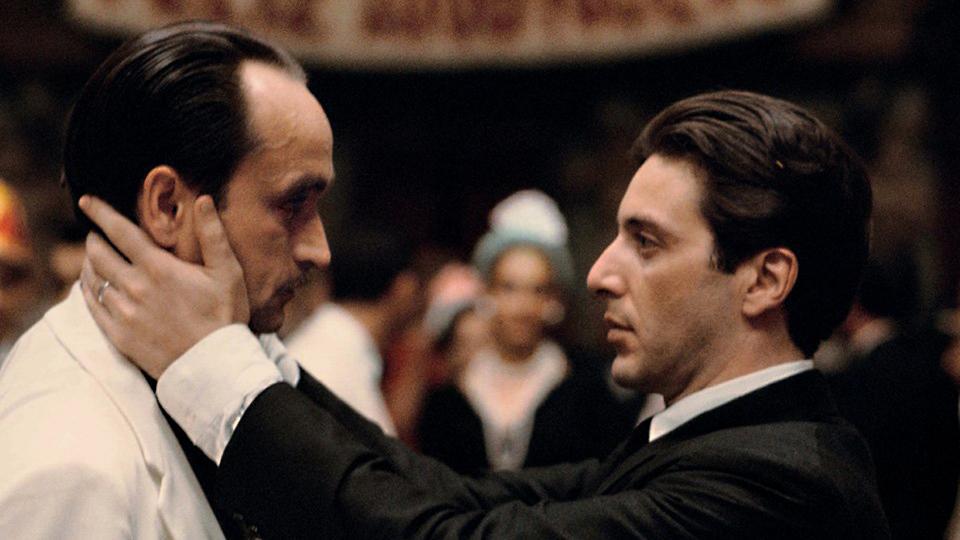American film critic Pauline Kael, while reviewing ‘The Godfather Part II’, starts off by writing – “At the close of The Godfather, Michael Corleone has consolidated his power by a series of murders and has earned the crown his dead father, Don Vito, handed him. In the last shot, Michael — his eyes clouded — assures his wife, Kay, that he is not responsible for the murder of his sister’s husband. The door closes Kay out while he receives the homage of subordinates, and if she doesn’t know that he lied, it can only be because she doesn’t want to. The Godfather, Part II begins where the first film ended: before the titles there is a view behind that door. The new king stands in the dark, his face lustreless and dispassionate as his hand is being kissed. The familiar Godfather waltz theme is heard in an ambiguous, melancholy tone. Is it our imagination, or is Michael’s face starting to rot? The dramatic charge of that moment is Shakespearean. The waltz is faintly, chillingly ominous.”
Michael Corleone, as Kael passionately describes, seems to stand “in the dark”. The white knight of the Corleone family is imprisoned within a cage created by himself. A young man who was supposed to fight for the country, gets embroiled in the mud of his own decisions. Who knew that the capable son would cause the demise of peace and prosperity? Michael Corleone is perhaps the most complex character created in film literature. With Francis Ford Coppola’s dexterous directorial adaptation, Corleone’s character is hard to define. As many would argue, Michael Corleone is on the brink of being a villain, or as some might even say, one of the greatest villains. However, does he really possess the qualities of an antagonist? Or does he resemble what Greek philosopher Aristotle calls – a “tragic hero”?
Understanding Michael through the Shade of Don Vito
Michael Corleone resembles his father’s domineering quietude. With his bulging yet icy eyes and a sunken posture, Corleone reconstructs the patriarchal authority. His transformation from a young man with hopes and ambitions to a brazenly stubborn mob boss is glacial and cold. Unlike his brother Sonny (James Caan), who presents his father’s dominance with brute strength, Michael is a discourse of the mind. His catapulting fall from the aspiring son to the morally tainted boss is set into motion from brinks of ‘The Godfather ‘(1972) when he calmly orders his men to assassinate the other New York dons with cold-blooded viciousness.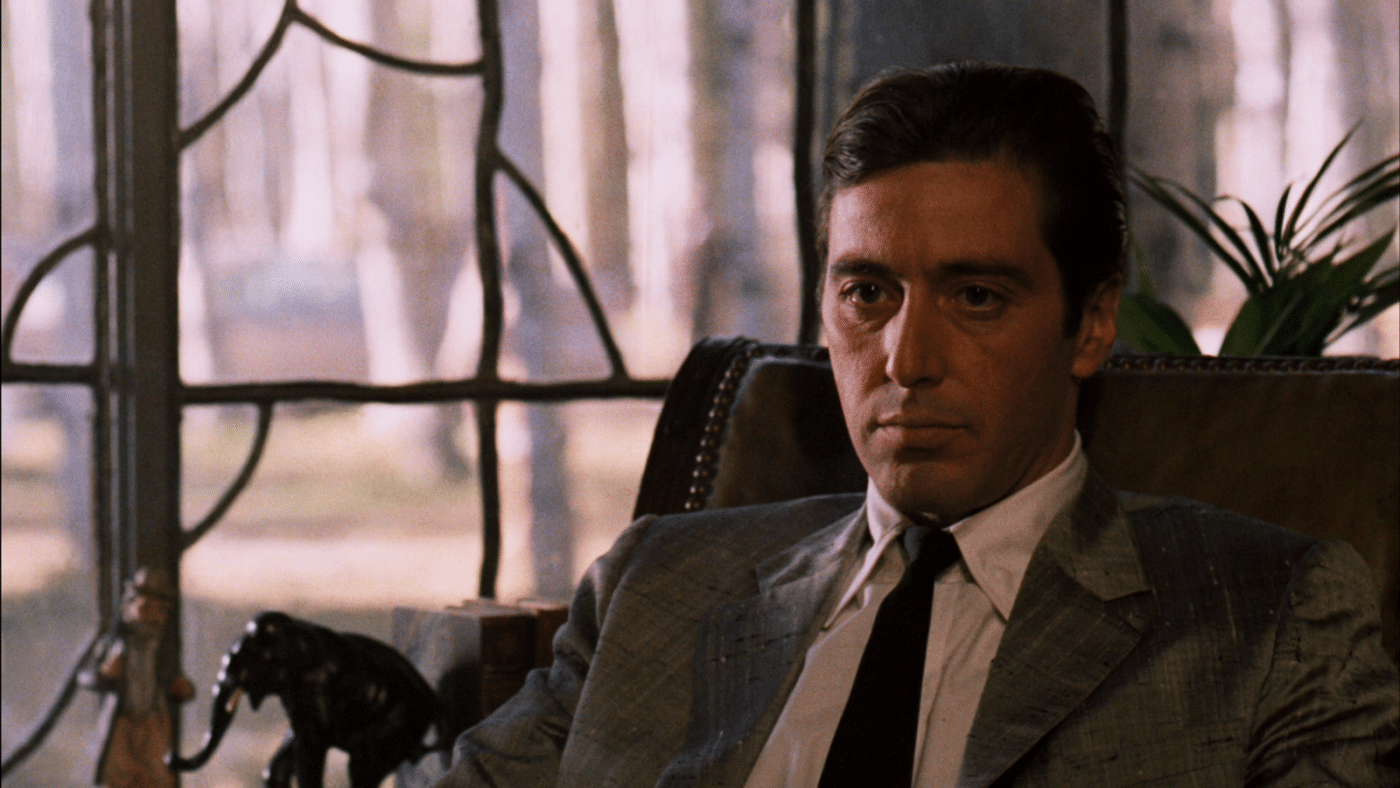 To bring his fall into perspective, it’s imperative to compare character arc with that of the man who he succeeded – Don Vito Corleone (Marlon Brando). The two characters work perfectly in complementing each other’s character arcs. The father and son are a means of creating an intersection so as to hand Michael the reins of the narrative henceforth. It’s quite interesting to see that this sketching technique has been augmented by Coppola with its deference from the Puzo’s book. While the book showcases Vito Corleone and his demise from the family patriarch to the broken individual in a slow and measured tonality, the film makes Vito a means for the viewers to have an intrinsic view of Michael’s transgression. In one particular scene, Vito, now the aged frail grandfather, chats with his son. His domineering persona has dwindled and the control isn’t there anymore. Hair is scruffy and his eyes seem distant. Vito Corleone is now just a father. The character arc of Vito is taken forth by Michael. ‘The Godfather’, whose narrative was led by Vito Corleone, brought in a domesticity in the gangster genre. For Vito, the family is most important. However, one sees a distinctive change in the tonality of Michael’s narrative. With a time jump of seven years, ‘The Godfather Part II’ begins quite similar to the prequel. The present-day narrative starts with son’s first communion party at Lake Tahoe – a call back to the previous film’s marriage function. However, unlike Connie’s wedding, the communion party is strenuous. Michael has to deal with the government, the police and other mob bosses. His stature is distinctly grown but does contain the magnetism possessed by his father. What Coppola does here, is write two parallel narratives – one showcasing the rise of a young Vito Corleone (Robert De Niro) and the other showcasing the present day narrative. This gives an insight to the rise of Vito Corleone to Don Vito as opposed to that of Michael Corleone.
To bring his fall into perspective, it’s imperative to compare character arc with that of the man who he succeeded – Don Vito Corleone (Marlon Brando). The two characters work perfectly in complementing each other’s character arcs. The father and son are a means of creating an intersection so as to hand Michael the reins of the narrative henceforth. It’s quite interesting to see that this sketching technique has been augmented by Coppola with its deference from the Puzo’s book. While the book showcases Vito Corleone and his demise from the family patriarch to the broken individual in a slow and measured tonality, the film makes Vito a means for the viewers to have an intrinsic view of Michael’s transgression. In one particular scene, Vito, now the aged frail grandfather, chats with his son. His domineering persona has dwindled and the control isn’t there anymore. Hair is scruffy and his eyes seem distant. Vito Corleone is now just a father. The character arc of Vito is taken forth by Michael. ‘The Godfather’, whose narrative was led by Vito Corleone, brought in a domesticity in the gangster genre. For Vito, the family is most important. However, one sees a distinctive change in the tonality of Michael’s narrative. With a time jump of seven years, ‘The Godfather Part II’ begins quite similar to the prequel. The present-day narrative starts with son’s first communion party at Lake Tahoe – a call back to the previous film’s marriage function. However, unlike Connie’s wedding, the communion party is strenuous. Michael has to deal with the government, the police and other mob bosses. His stature is distinctly grown but does contain the magnetism possessed by his father. What Coppola does here, is write two parallel narratives – one showcasing the rise of a young Vito Corleone (Robert De Niro) and the other showcasing the present day narrative. This gives an insight to the rise of Vito Corleone to Don Vito as opposed to that of Michael Corleone.
Dominance – Michael’s American Dream
What moulds Michael Corleone as a tragic hero is the narrative’s distinctive tone of the “American Dream”. Coined by American writer and historian James Truslow Adams in his book ‘The Epic of America’ (1931), the historian suggested that the “America Dream is that dream of a land in which life should be better and richer and fuller for everyone, with opportunity for each according to ability or achievement. It is a difficult dream for the European upper classes to interpret adequately, and too many of us ourselves have grown weary and mistrustful of it. It is not a dream of motor cars and high wages merely, but a dream of social order in which each man and each woman shall be able to attain to the fullest stature of which they are innately capable, and be recognized by others for what they are, regardless of the fortuitous circumstances of birth or position.” Coppola, designing the two dons in different tonality seems to have sketched out Vito as the incarnation of the “American Dream”. Despite his questionable business, Vito is a respected figure in his community. In ‘The Godfather Part II’, the standards of the “American Dream” set with his rise after killing Don Fanucci, a Black Hand extortionist in Little Italy. Feared by most, Fanucci’s death immediately catapults Vito as the new Don. In one sequence, now the respected figure in his community, Vito is approached for help by a widow who is being evicted. After an unsuccessful negotiation with the widow’s landlord, where he shows his distaste towards Vito, the widow’s landlord asks around and learns of Vito’s reputation, agreeing to let the widow stay on terms very favourable to her. Vito’s stature transforms from a small-time crook to a respected don.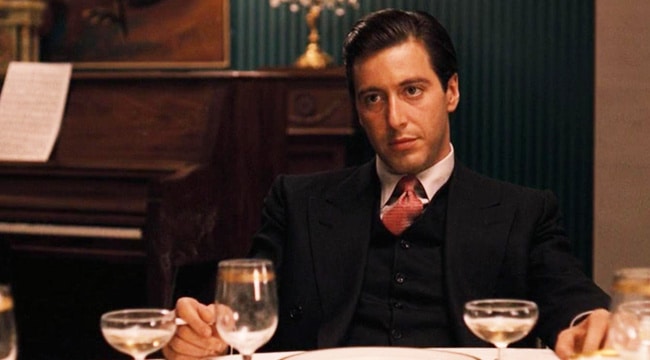 However, Michael’s character arc is designed as a tragic one. Unlike father, he is presented as the quiet and calm man of the Corleone family. He seems to have acquired the positive traits from his father. On one hand, the eldest, Sonny, is a competent but hot-headed young man whose rage brings him to his ultimate demise and on the other, the middle, Fredo, is a good but naïve man who fails to understand the gravity of situations; Michael is reasonable and does not adhere to the patriarchal figures. In the last sequence of ‘Godfather Part II’, we see Michael sitting quietly and reminiscing about the days he wanted to leave the family business. Set in the winter of 1941, the Corleone family gathers in their dining room to surprise Vito for his birthday. The merriness turns sour as Michael divulges that, in response to the attack on Pearl Harbor, he has left college and has enlisted in the United States Marine Corps, leaving Sonny enraged and Tom in utter disbelief. With Fredo being the only brother supportive, Michael sits alone as the others leave the room to greet Vito. The scene works as a call back to Michael’s shade as a tragic hero. He starts off as the noble prince who although loves his family, chooses to stay out of their shady deeds.
However, Michael’s character arc is designed as a tragic one. Unlike father, he is presented as the quiet and calm man of the Corleone family. He seems to have acquired the positive traits from his father. On one hand, the eldest, Sonny, is a competent but hot-headed young man whose rage brings him to his ultimate demise and on the other, the middle, Fredo, is a good but naïve man who fails to understand the gravity of situations; Michael is reasonable and does not adhere to the patriarchal figures. In the last sequence of ‘Godfather Part II’, we see Michael sitting quietly and reminiscing about the days he wanted to leave the family business. Set in the winter of 1941, the Corleone family gathers in their dining room to surprise Vito for his birthday. The merriness turns sour as Michael divulges that, in response to the attack on Pearl Harbor, he has left college and has enlisted in the United States Marine Corps, leaving Sonny enraged and Tom in utter disbelief. With Fredo being the only brother supportive, Michael sits alone as the others leave the room to greet Vito. The scene works as a call back to Michael’s shade as a tragic hero. He starts off as the noble prince who although loves his family, chooses to stay out of their shady deeds.
Re-establishing Order through Revenge
Michael’s tragedy works to a different tone as opposed to what Aristotle describes.
In William Shakespeare’s 16th century play ‘The Merchant of Venice’, the antagonist, Shylock, promises to exact revenge from his rival, Antonio, whose antisemitic rants and insults have riled him. Shylock, puts forth the condition that if Antonio is unable to repay a debt on the specified date, Shylock may take a pound of Antonio’s flesh, saying, “If you prick us do we not bleed? If you tickle us do we not laugh? If you poison us do we not die? And if you wrong us shall we not revenge?”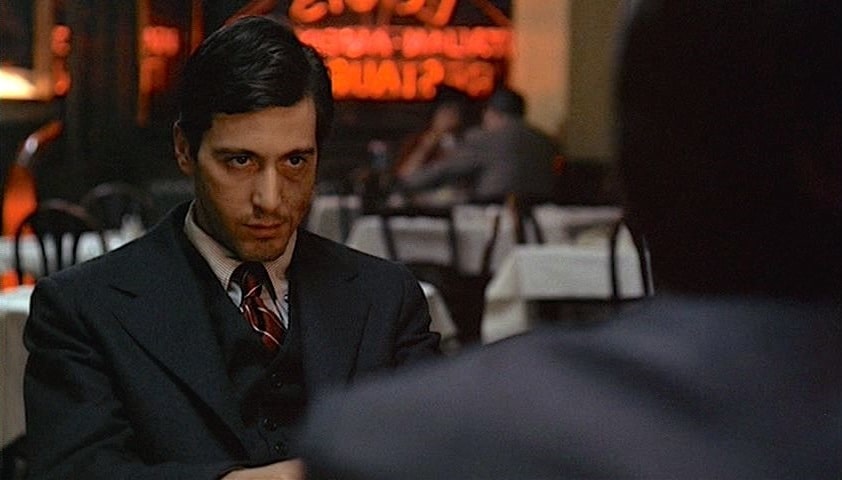 While the circumstances might be different, Michael’s tragedy is sparked off similarly. He cunningly waits for his mother’s death to kill the people who betrayed his family and killed his brother. His philosophy is spearheaded by “And if you wrong us shall we not revenge?” While Vito announces his intent to make peace with other families, Michael lets loose the reigns and declares a new era of organised crime, deceit and death. His anger works as a boomerang which slowly charges towards his own family, where he kills off his own brother, Fredo.
While the circumstances might be different, Michael’s tragedy is sparked off similarly. He cunningly waits for his mother’s death to kill the people who betrayed his family and killed his brother. His philosophy is spearheaded by “And if you wrong us shall we not revenge?” While Vito announces his intent to make peace with other families, Michael lets loose the reigns and declares a new era of organised crime, deceit and death. His anger works as a boomerang which slowly charges towards his own family, where he kills off his own brother, Fredo.
Patriarchal Authoritarianism – Rooting Political and Social Superiority
Both Vito and Michael possess one important thing – Authoritarianism. However, Michael, who is designed as a tragic hero, commands the authoritarian figure more than that of his father. Vito works as a people’s man. His position is important to his people. His seat is important for justice. Michael, on the other hand, is fuelled by power. Of course, his gradual entrapment into the world of crime can be argued to be imposed. With Sonny’s murder, father’s demise and Fredo’s incompetency, Michael is left with no choice but to take on the throne of the Corleone crime family. British sociologist Sylvia Walby provides six overlapping structures that define patriarchy that take different forms in different cultures and different times in Anthony Giddens’ book ‘Sociology’. Among these six points, perhaps three of them work the best in Michael’s patriarchal dominance –
- The state: women are unlikely to have formal power and representation
- The household: women are more likely to do the housework and raise the children
- Violence: women are more prone to being abused
With his rising power, Michael’s relationship with Kay deters. From sharing an intellectual love and admiration as a young couple, Michael and Kay start distancing from each other as time passes. Kay continuously presses Michael about his involvement in crime and he continually reasserts his dominance. Kay, as he sees, should be taking care of their children rather than questioning his every move. His promise of completely legitimising his family’s business withers away and so does their relationship. This friction sparks off the tragic flaw or as Aristotle defines – “change of fortune which should be not from bad to good, but, reversely, from good to bad. And, such misfortune is visited upon the tragic hero not through vice or depravity but by some error of judgment.” This error of judgement in Aristotelian concepts is hamartia which refers to a flaw or a mistake made by the hero. Michael, through the course of the film, learns that Kay has had a miscarriage. His love for her deepens as he feels that he has not been giving time to her and his children. 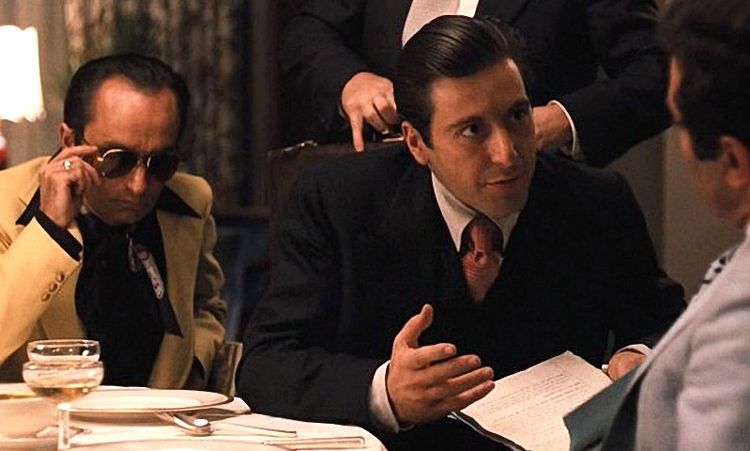
However, to Michael’s utter shock and dismay, it is revealed that Kay chose to abort their third child as she does not want another Corleone child to grow in a criminal family. The scene is taken over by a gloomy undertone. Michael’s emphatic approach turns into disdain and hatred. He is furious and slaps Kay, thereby making an error in judgement. This change in fortune, occurring in act three, turns Michael into a villainous and distrusting patriarch. His breaks all relations with Kay and keeps his children away from her. He refuses to talk to his brother Fredo, who had betrayed him unknowingly. And when he does reconcile, Michael chooses to kill him, leaving what his father considered the most important – family – in shambles.
Vito’s rise to power culminates with him exacting his childhood vengeance by knifing Ciccio after revealing his old identity and ultimately embracing his identity as a Corleone. Michael’s rise to power culminates with him cracking open his own gyre.
Michael Corleone is a complex character with shades of grey which makes it tough to define him as a human. His tranquil eyes and composed demeanour turns into an icy discourse. A man whose path should’ve been determined by his virtues derails and he is now defined by his vices. Michael, at the start, represents the society of balance and intellect. Through the passage of time, however, his persona is underlined by extremities. Michael’s characteristics as a tragic hero do not adhere to the classic Aristotelian concepts. His fall isn’t death or materialistic losses. His fall is philosophical.

